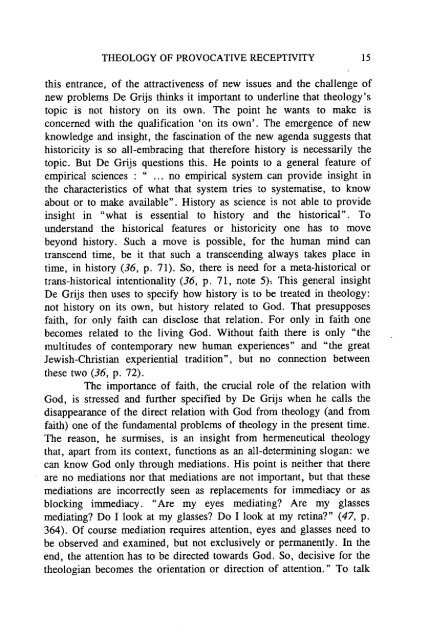Jaarboek Thomas Instituut 1995 - Thomas Instituut te Utrecht
Jaarboek Thomas Instituut 1995 - Thomas Instituut te Utrecht
Jaarboek Thomas Instituut 1995 - Thomas Instituut te Utrecht
Create successful ePaper yourself
Turn your PDF publications into a flip-book with our unique Google optimized e-Paper software.
THEOLOGY OF PROVOCATIVE RECEPTIVITY 15<br />
this entrance, of the attractiveness of new issues and the challenge of<br />
new problems De Grijs thinks it important to underline that theology's<br />
topic is not history on its own. The point he wants to make is<br />
concerned with the qualification 'on its own'. The emergence of new<br />
knowledge and insight, the fascination of the new agenda suggests that<br />
historicity is so all-embracing that therefore history is necessarily the<br />
topic. But De Grijs questions this. He points to a general feature of<br />
empirical sciences : " ... no empirical sys<strong>te</strong>m can provide insight in<br />
the charac<strong>te</strong>ristics of what that sys<strong>te</strong>m tries to sys<strong>te</strong>matise, to know<br />
about or to make available". History as science is not able to provide<br />
insight in "what is essential to history and the historical". To<br />
understand the historical features or historicity one has to move<br />
beyond history. Such a move is possible, for the human mind can<br />
transcend time, be it that such a transcending always takes place in<br />
time, in history (36, p. 71). So, there is need for a meta-historical or<br />
trans-historical in<strong>te</strong>ntionality (36, p. 71, no<strong>te</strong> 5), This general insight<br />
De Grijs then uses to specify how history is to be trea<strong>te</strong>d in theology:<br />
not history on its own, but history rela<strong>te</strong>d to God. That presupposes<br />
faith, for only faith can disclose that relation. For only in faith one<br />
becomes rela<strong>te</strong>d to the living God. Without faith there is only "the<br />
multitudes of con<strong>te</strong>mporary new human experiences" and "the great<br />
Jewish-Christian experiential tradition", but no connection between<br />
these two (36, p. 72).<br />
The importance of faith, the crucial role of the relation with<br />
God, is stressed and further specified by De Grijs when he calls the<br />
disappearance of the direct relation with God from theology (and from<br />
faith) one of the fundamental problems of theology in the present time.<br />
The reason, he surmises, is an insight from hermeneutical theology<br />
that, apart from its con<strong>te</strong>xt, functions as an all-de<strong>te</strong>rmining slogan: we<br />
can know God only through mediations. His point is neither that there<br />
are no mediations nor that mediations are not important, but that these<br />
mediations are incorrectly seen as replacements for immediacy or as<br />
blocking immediacy. "Are my eyes mediating? Are my glasses<br />
mediating? Do I look at my glasses? Do I look at my retina?" (47, p.<br />
364). Of course mediation requires at<strong>te</strong>ntion, eyes and glasses need to<br />
be observed and examined, but not exclusively or permanently. In the<br />
end, the at<strong>te</strong>ntion has to be direc<strong>te</strong>d towards God. So, decisive for the<br />
theologian becomes the orientation or direction of at<strong>te</strong>ntion." To talk








